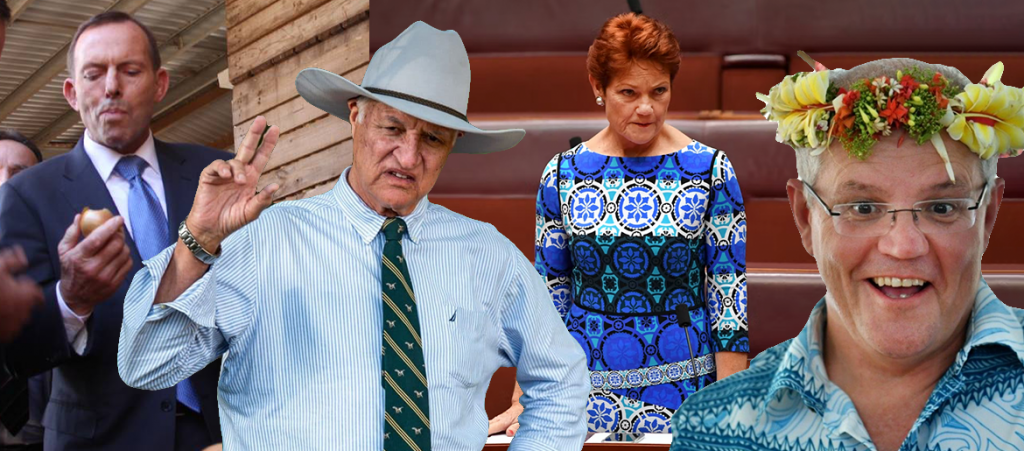
Prefer to listen to this article instead? The audio version is live now on Spotify and YouTube.
In the very first week of the new Parliament – on just the second sitting day – Pauline Hanson walked out of the Senate chamber in petulant protest. She interrupted the Acknowledgement of Country (which has been standard practice in Parliament for over a decade) and stormed out. We shouldn’t be surprised by her antics, as stunts like this are a standard part of her routine. It’s expected, as was the stream of admittedly very funny memes that followed, taking the piss out of the Senator’s tantrum.
For young people in particular, that’s become the routine of political content. A three-step cycle:
- We mostly ignore the day-to-day humdrum of the political machine, until…
- One of the players breaks out of the dry newscycle by saying or doing something outrageous, that…
- Sparks a series of satirical social media posts, turning the spectacle into both a laugh and talking point for a few days.
Rinse, repeat.
But given how the Internet and social algorithms are increasingly shaping our political landscape, it might be time to consider how memeifying far right politicians is giving them the very cultural relevance they need to spread their harmful, dangerous messages.
Far right and extremist groups already leverage media coverage as a tool to spread their message, recruit members, and give the impression that their ideas are worthy of debate. It’s a fundamental part of their strategy, and such an effective tactic that there are handbooks to help journalists and news outlets cover these groups without amplifying their dangerous ideology.
By the very nature of their role, politicians are already public figures whose words and actions need public scrutiny. Of course, they will be in the news. Even still, politicians use similar strategies to achieve the same goals, especially independent and minority party politicians whose careers rely almost entirely on name recognition. Without the support of major party marketing teams, media stunts help keep their names in our mouths.
None of that is new – but the power of the algorithmic Internet is. As is the fact that we are increasingly getting our news from social media platforms and non-traditional sources, including political meme and comedy creators.
By making fun of inflammatory stunts like Hanson’s, the accounts are able to push those politicians out of the ‘news’ sphere and insert them into pop culture. The memes give conservative pollies relevance, stickiness and help them reach people they otherwise wouldn’t.
That cultural relevance gives them even more power. And the extra public attention, good or bad, earns them spots on Sky News, the ABC, breakfast TV shows, and sympathetic interviews with ‘Crap Housewife’ Jessica Rowe. If you can become a talked-about political figure, the list of opportunities to spread your harmful views is probably endless.
And being meme-d certainly helps you get talked about.
It’s why the likes of Hanson and Bob Katter are widely recognised public figures, while someone like Andrew Wilkie is only a familiar face for AusPol diehards. Even within the major parties, for backbenchers the only fast way to transition from indistinguishable-politician-in-suit to recognised name is by saying something cooked enough to turn you into a meme, elbowing your way into pop culture. See: Craig Kelly.
Turning politicians into the butt of an online joke always seems to wave away the objectively bad things they do with their power, too. When former NSW Premier Gladys Berejiklian became ‘Gladdy B’ online, the scorned lover storyline undermined the much harsher truth: that she resigned over serious abuse of power allegations. During the pandemic, West Australians turned Premier Mark McGowan into ‘Daddy McGowan’, despite his harsh border rules potentially breaching human rights law.
I can already see this starting to happen to Scott Morrison. Images of him as a naughty boy relegated to the backbench might just recast our collective memory of him as a fool who just didn’t get it. In reality he was a cruel and dismissive Prime Minister who failed on almost every measure.
After we’ve had a little laugh, it’s easier to remember them as stupid or hapless or simply not that bad. Memes have a way of softening the sharp edges conservative politicians use to cut us.
I’m not saying we need to kill all satire. Taking the piss is a valid and powerful form of political criticism and part of Australia’s proud history of irreverence. Supercharged by digital platforms, for many people it’s their first exposure to politics – and yes, everyone should be engaging in politics in some way. Who am I to judge if your Question Time updates come from The Shovel instead of the Guardian live blog?
Political memes can still be biting. My all-time favourite is The Betoota Advocate’s long-running Uncle Tony X series, which leans into the ridiculousness of Tony Abbott being named the Special Envoy on Indigenous Affairs in 2018. The idea of Abbott believing himself to be an Indigenous revolutionary is deeply uncomfortable, and highlights rather than hides the fact that he had power to wield.
Memes flatten political figures into almost fictional characters, and in doing so invent excuses for their decisions. The lines between hyperbole and the real harm are blurred. A lot of memes about Pauline Hanson portray her as too stupid to know what she’s doing, baddie Gladys as being ‘tricked’ by Daryl Maguire. Their misdeeds are played down, instead of being sent up.
When the meme-versions of conservative politicians become more ubiquitous than the far less funny reality, it clears a path for them to do even more damage. Are we reaching that point in Australia?




Comments are closed.